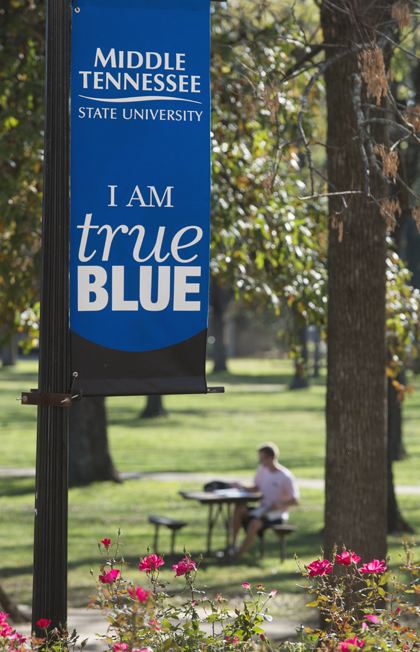
Interior Design
Turn your creativity into a career with an accredited program for residential, commercial, and innovative design.
Interior Design, B.S.
The Bachelor of Science in Interior Design is offered through the College of Behavioral and Health Sciences at MTSU.
Want to learn how to turn your passion for creative design into a career? When you are in a space, do you take notice of your surroundings and immediately think of ways to make it better? The interior design program at MTSU offers the skills and knowledge you need to connect people to the spaces where they live, work, learn, and play. Interior designers are trained to create residential and commercial spaces that protect and enhance the health, safety, welfare, and well-being of the public. From proper lighting to ergonomics, studying Interior Design can open up a world of opportunities for those with creative minds.
Accreditation
The Interior Design curriculum meets the requirements for Allied membership in the American Society of Interior Designers and Affiliate membership in the International Interior Design Association. Accredited by the Council for Interior Design Accreditation (www.accredit-id.org), the B.S. degree offers preparation for entry-level positions in residential and contract design firms, sales, design consulting, computer-aided design, and other related design areas. The program includes a major in Interior Design and a professional core in Human Sciences, art, and business. The Interior Design Program leading to the Bachelor of Science (B.S.) degree in Interior Design is accredited by the Council for Interior Design Accreditation, 206 Grandville Avenue, Suite 350, Grand Rapids, MI 49503. The CIDA-accredited program prepares students for entry-level interior design practice, for advanced study, and to apply for membership in professional interior design organizations. The Bachelor of Science (B.S.) degree in Interior Design granted by Middle Tennessee State University meets the educational requirement for eligibility to sit for the National Council for Interior Design Qualification Examination (NCIDQ Exam). For more information about NCIDQ Exam eligibility visit: https://www.cidq.org/eligibility-requirements. This program is approved for the Academic Common Market.
Middle Tennessee State University is accredited by Council for Interior Design Accreditation (www.accredit-id.org) and The National Association of Schools of Art & Design.
Student Achievement Data
2023/2024 Student Achievement Data
Study Abroad Opportunities
- INVTUR Conference and ProGlobe Summer Camp, Portugal, May 2024 Participants and Grant Recipients: Emma Bauer, Victoria Platt, Erin Vineyard
- ProGlobe and Design Thinking Summer Camp, Germany, May 2023 Participants and Grant Recipients: Meret Girgis, Mahala Owen, Jorden Johnson, Jacob Davis
- ViMoAll Conference, Germany, May 2023 Participants and Grant Recipients: Meret Girgis, Mahala Owen, Jorden Johnson
- Abigail Senadenos was awarded the U.S. Department of State’s Benjamin A. Gilman International Scholarship
- Study Abroad Argentina
Virtual and In-Person Exchanges
- 2019-2024: ProGlobe International Project and Conference
- 2019-Bryce Massey, Berlin
- 2020-American Society of Interior Designers (ASID)-Scale Conference-Seattle, Washington-Lauren Schrimsher, Rachel Whorton, Aubree Davis
- 2020-American Society of Interior Designers (ASID)-Scale Conference-Seattle, Washington-Lauren Schrimsher, Rachel Whorton, Aubree Davis
- 2021-International Virtual Exchange Conference (IVEC), Newcastle, UK: Lauren Schrimsher panelist and presenter.
- 2022-The Network of Executive Women in Hospitality (NEWH) Conference, Student officers: Hope Weaver, Dakota Sokoloski, Tayler Beale, Mahala Owen, Luka Arnautovic, Makayla Morrical
If you live in one of these states: DE; you may be able to attend MTSU at in-state rates under the Academic Common Market program.
News Briefs

Interior Design Hosts a Series of 30 Under 30 Events
Congratulations to Lauren Schrimsher (’21) for being recognized as one of the top Interior Design professionals under the age of 30 in Nashville, by INTERIOR DESIGN Magazine. 30/30 is a program where the top 30 designers under the age of 30 are recognized at a prestigious event hosted by INTERIOR DESIGN Magazine, which has a strong history of recognizing those who excel in the design industry. After graduating from MTSU, Lauren went on to receive her Master of Science in Construction Management and is currently working as a designer at Inner Design Studio. Lauren’s work includes a diverse range of healthcare projects located all over the United States, ranging from behavioral health facilities to free-standing emergency departments. Lauren continues to grow her knowledge and passion for innovative and accessible solutions by incorporating thoughtful, research-based evidence into her designs.


Benjamin A. Gilman International Scholarship Awarded to Abigail Senadenos
Abigail Senadenos was awarded the U.S. Department of State’s Benjamin A. Gilman International Scholarship. This scholarship is a grant program that enables students of limited financial means to study or intern abroad, thereby gaining skills critical to our national security and economic competitiveness. Abigail was one of only two recipients for MTSU who received this prestigious award.
News Briefs
Interior Design Hosts a Series of 30 Under 30 Events

Congratulations to Lauren Schrimsher (’21) for being recognized as one of the top Interior Design professionals under the age of 30 in Nashville, by INTERIOR DESIGN Magazine. 30/30 is a program where the top 30 designers under the age of 30 are recognized at a prestigious event hosted by INTERIOR DESIGN Magazine, which has a strong history of recognizing those who excel in the design industry. After graduating from MTSU, Lauren went on to receive her Master of Science in Construction Management and is currently working as a designer at Inner Design Studio. Lauren’s work includes a diverse range of healthcare projects located all over the United States, ranging from behavioral health facilities to free-standing emergency departments. Lauren continues to grow her knowledge and passion for innovative and accessible solutions by incorporating thoughtful, research-based evidence into her designs.

Benjamin A. Gilman International Scholarship Awarded to Abigail Senadenos

Abigail Senadenos was awarded the U.S. Department of State’s Benjamin A. Gilman International Scholarship. This scholarship is a grant program that enables students of limited financial means to study or intern abroad, thereby gaining skills critical to our national security and economic competitiveness. Abigail was one of only two recipients for MTSU who received this prestigious award.
Related Media

Katie Vance Named MTSU 2022-2023 Distinguished Alumnus
One of the top designers of Nashville’s booming restaurant and hospitality scene, Vance’s work includes Butcher and Bee, Butchertown Hall, The Green Pheasant, The Russell Hotel, The Cordelle and many more. At Powell Architecture, she runs the interior design department, plus the firm’s marketing and social media endeavors.
Vance founded Porter Flea, a well-known handmade modern craft market, to propel Nashville’s independent craft and design scene. She is a 2021 recipient of the Nashville Business Journal’s 40 Under 40 award. Her work has earned praise from regional and national publications, including Garden & Gun, Architectural Digest, Domino, Dwell and Southern Living. She has served on many juries for the MTSU Interior Design Program midterm and final reviews.

Professional Licensure Disclosure
The Bachelor of Science (B.S.) degree in Interior Design at Middle Tennessee State University (MTSU) is accredited by the Council for Interior Design Accreditation (CIDA) and meetsthe educational requirement for eligibility to sit for the National Council for Interior Design Qualification Examination (NCIDQ Exam). For more information about NCIDQ Exameligibility visit: https://www.cidq.org/eligibility-requirements. Meeting CIDQ’s work experience requirements does not guarantee a candidate will meet their local jurisdiction’s requirements to be a licensed, certified, registered interior designer. Currently the state of Tennessee does not require state licensure or certification. https://www.tn.gov/commerce/licensing-regulations.html MTSU cannot confirm whether this program will meet all of the requirements of anotherU.S. state or territory that requires a state license. Students should be aware that licensure requirements vary from state to state and are subject to change and consult with the licensing board for each state. Check local jurisdiction for requirements.
Careers
Because career preparation is integrated into all areas of the MTSU Interior Design student experience, your journey towards professional life begins the moment you step on campus. MTSU interior design and architecture faculty are practitioners and educators dedicated to providing graduates with the skills and experiences needed to flourish in a profession that is vital to the health, safety, and happiness of people around the world. Interior architects are responsible for making sure that everything that influences the function and perception of a space is effective. From hospitals and offices to housing and retail, interior architects ensure that interior spaces meet the needs of both the building’s owner and its users. The program has an extensive network of local and global firms which support professional experiences through industry-engaged studios, internships, and a variety of industry and program sponsored programming that connects students to professionals.



Overview
”The Interior Design Program leading to the Bachelor of Science (B.S.) degree in Interior Design is accredited by the Council for Interior Design Accreditation, www.accredit-id.org, 206 Grandville Avenue, Suite 350, Grand Rapids, MI 49503.”
Mission
The mission of the interior design program at Middle Tennessee State University is to provide an experiential educational program that prepares graduates for entry-level positions in the field in addition to life long and academic learning. The experiential curriculum prepares student to successfully engage in an evolving profession influenced by globalization, human needs, and technology.
Philosophy
The interior design program’s educational philosophy supports the mission and goals by providing a student-centered, experiential learning environment. The focus is on preparing students through project and problem based learning wherein students use independent and critical thinking, content knowledge, and creativity to address human/built environment issues. Faculty serve as guides and facilitators in assisting students in reaching their full potential.
Goals
- Think critically to identify and solve problems
- Communicate verbally, visually, and in writing
- Address human condition via design, health, safety, welfare
- Use content knowledge to develop creative solutions
- Conduct themselves in an ethical manner
Resources
- Professional Organizations
- Program Events
- Student Projects
- Interior Design Registration, TN
- Council for Interior Design Accreditation (CIDA)
- 2024 Student Handbook
Articles
- MTSU News articles about Interior Design program
- ’MTSU On the Record’ highlights projects on slave economy, virtual collaboration
- Virtual Exchanges: Developing Guidelines for Students and Faculty
Highlights
Senior interior design student Jorden Johnson, Fall 2023 URECA award recipient, will present at this year’s National Council for Undergraduate Research conference in Long Beach, California in April. The title of her presentation is “Assessing the Fidelity of Illuminating Engineering Society (IES) Profiles in Architectural Lighting Simulations: A Comparative Analysis.” Jaimie Burriss takes a group photo with all presenters each year that we could add later if needed.
Senior interior design student Kelsie Davy was featured in the Daily News Journal about her Formica project fabrication and presentation at Inspire 2023. https://www.dnj.com/story/news/local/schools/mtsu/2023/11/06/mtsu-mondays-interior-design-honored-online-offerings-doubled/71411982007/
MTSU’s Julian honored with interior design Volunteer Excellence Award
Middle Tennessee State University professor and Interior Design Program Director Kristi Julian has been honored with the 2022 Keith Hooks Volunteer Excellence Award in recognition. Read more.

Simulation Collaboration
The purpose of this project simulation is to provide experiential learning and determine the effectiveness of the classroom simulation event as a teaching tool to improve understanding of the needs of older disabled adults or live “events”. These yearly simulations address and measure how well basic human needs are met and focuses on providing an environment conducive to individual and family well-being. They demonstrate how the built environment contribute to the common good, and a shared moral/ethical culture is transmitted from generation to generation. They also demonstrate generational life span and life course development within the eco-systems theory (ecological framework) as the professional focuses on the well-being of individuals and families and the communities in which they live.

Dismas House and Doors of Hope
For the Dismas House/Doors of Hope Project, social justice, cultural emphasis and economic diversity were all addressed with the student research referenced CAPSA. For the Domestic Violence Center project student project solutions addressed domestic violence, sexual abuse, and rape recovery. Student generated research, program booklets discussed how to design support centers and physical environments for women, men, and children impacted by abuse. Student process sketches, notes and design analyses discussed how these types of facilities must be designed to not only provide a safe place for victims, but the interior environment must heal its occupants.
Student work noted the importance of support for victims of domestic violence and sexual assault and how to reduce incidents of abuse through prevention education. Student solutions also discussed the cognitive changes and interpersonal relationships of women who have suffered from domestic abuse and how cultural, economic and ecological contexts informed their design. This project demonstrates how the built environment may contribute to the common good, and a shared moral/ethical culture is transmitted from generation to generation. Communities foster a sense of well-being of individuals and families and often turn groups of people into social clusters that resemble extended families.



CONTACT US

Please fill in the form below and we will contact you very soon











